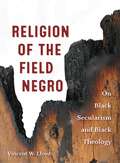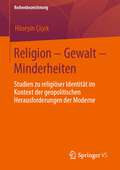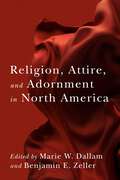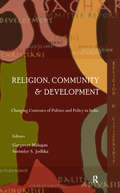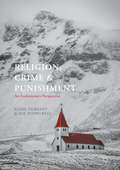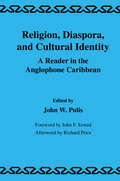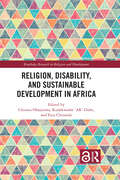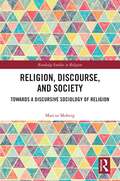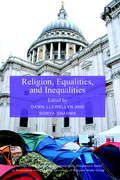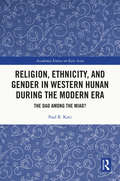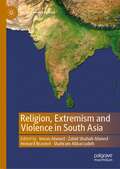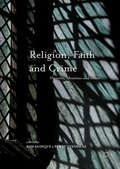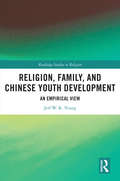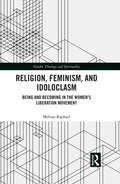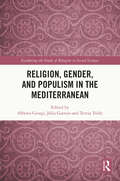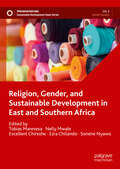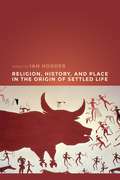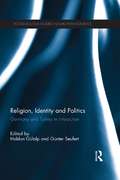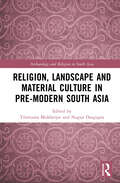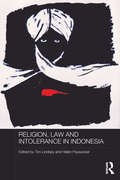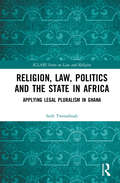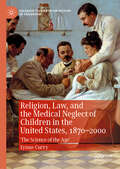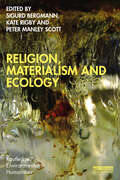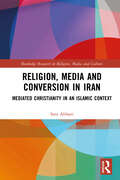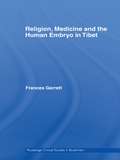- Table View
- List View
Religion of the Field Negro: On Black Secularism and Black Theology
by Vincent W. LloydBlack theology has lost its direction. To reclaim its original power and to advance racial justice struggles today black theology must fully embrace blackness and theology. But multiculturalism and religious pluralism have boxed in black theology, forcing it to speak in terms dictated by a power structure founded on white supremacy. In Religion of the Field Negro, Vincent W. Lloyd advances and develops black theology immodestly, privileging the perspective of African Americans and employing a distinctively theological analysis.As Lloyd argues, secularism is entangled with the disciplining impulses of modernity, with neoliberal economics, and with Western imperialism – but it also contaminates and castrates black theology. Inspired by critics of secularism in other fields, Religion of the Field Negro probes the subtle ways in which religion is excluded and managed in black culture. Using Barack Obama, Huey Newton, and Steve Biko as case studies, it shows how the criticism of secularism is the prerequisite of all criticism, and it shows how criticism and grassroots organizing must go hand in hand. But scholars of secularism too often ignore race, and scholars of race too often ignore secularism. Scholars of black theology too often ignore the theoretical insights of secular black studies scholars, and race theorists too often ignore the critical insights of religious thinkers. Religion of the Field Negro brings together vibrant scholarly conversations that have remained at a distance from each other until now. Weaving theological sources, critical theory, and cultural analysis, this book offers new answers to pressing questions about race and justice, love and hope, theorizing and organizing, and the role of whites in black struggle. The insights of James Cone are developed together with those of James Baldwin, Sylvia Wynter, and Achille Mbembe, all in the service of developing a political-theological vision that motivates us to challenge the racist paradigms of white supremacy.
Religion – Gewalt – Minderheiten: Studien zu religiöser Identität im Kontext der geopolitischen Herausforderungen der Moderne
by Hüseyin ÇiçekDer Band nimmt aus unterschiedlichen religionswissenschaftlichen und sozialwissenschaftlichen Perspektiven aktuelle Themen der Religionswissenschaft in den Blick. Sie gehen explizit oder implizit von der zentralen religionswissenschaftlichen sowie -politischen These aus, dass Solidarität im Inneren von Gemeinschaften durch Feindschaft nach Außen begünstigt wird. Diese simpel wirkende Formel hat viele Facetten und wird deshalb in den jeweiligen Artikeln mit dem spezifischen Fokus auf Religion, Gewalt/Terrorismus und Minderheiten aus unterschiedlichen Perspektiven analysiert, um sie sowohl komparativ als auch konnektiv auf den Prüfstand zu stellen.
Religion, Attire, and Adornment in North America
by Marie W. Dallam and Benjamin E. ZellerClothing, dress, and ornamentation are crucial parts of individual and communal religious life and practice, yet they are too often overlooked. This book convenes leading scholars to explore the roles of attire and adornment in the creation and communication of religious meaning, identity, and community. Contributors investigate aspects of religious dress in North America in the nineteenth, twentieth, and twenty-first centuries, considering adornment practices in a wide range of religious traditions and among individuals who straddle religious boundaries. The collection is organized around four frameworks for understanding the material culture of religion: theological interpretation, identity formation, negotiation of tradition, and activism.Religion, Attire, and Adornment in North America features essays on topics such as Black Israelites’ use of African fabrics, Christian religious tattoos, Wiccan ritual nudity, Amish “plain dress,” Mormon sacred garments, Hare Krishna robes, and the Church of Body Modification. Spanning the diversity of religious practice and expression, this book is suitable for a range of undergraduate courses and offers new insights for scholars in many disciplines.
Religion, Community and Development: Changing Contours of Politics and Policy in India (Religion and Citizenship)
by Gurpreet Mahajan Surinder S. JodhkaBy making religious community a relevant category for discussing development deficit, the Sachar Committee Report (that was submitted to the Prime Minister of India in 2007) initiated a new political discourse in India. While the liberal secular framework privileged the individual over the community and was more inclined to use the category of class rather than the identity of religion, the Sachar Committee differentiated citizens on the basis of their religious identity. Its conclusions reinforced the necessity of approaching issues of development through the optic of religious community. This volume focuses on this shift in public policy. The articles in this collection examine the nature and implications of this new approach to the Indian social reality. Taking a close look at the findings of the Sachar Committee Report (SCR) they highlight the challenges posed by inter-community comparisons. At another level the articles supplement the debate initiated by the SCR by constructing a profile of religious communities in India so as to factor in their concerns of development into the present discourse and to nuance and modify the simple indicators to which development is often reduced. As most religious communities are themselves engaged in development-related activities the volume also examines some of these initiatives in order to see what development connotes to the members themselves and what receives attention by the community. Students of social sciences and development studies as well as those dealing with issues of marginalization will find this collection an invaluable resource for understanding contemporary India and for undertaking further theoretical and empirical research.
Religion, Crime and Punishment
by Russil Durrant Zoe PoppelwellThis book provides a critical discussion of the way in which religion influences: criminal and antisocial behaviour, punishment and the law, intergroup conflict and peace-making, and the rehabilitation of offenders. The authors argue that in order to understand how religion is related to each of these domains it is essential to recognise the evolutionary origins of religion as well as how genetic and cultural evolutionary processes have shaped its essential characteristics. Durrant and Poppelwell posit that the capacity of religion to bind individuals into socially cohesive 'moral communities' can help us to understand its complex relationship with cooperation, crime, punishment, inter-group conflict and forgiveness. An original and innovative study, this book will be of special interest to criminologists and other social scientists interested in the role of religion in crime, punishment, intergroup conflict and law.
Religion, Diaspora and Cultural Identity: A Reader in the Anglophone Caribbean (Library Of Anthropology. Ser. #Vol. 14.)
by J.W. PulisAlthough the religions of the Caribbean have been a subject of popular media, there have been few ethnographic publications. This text is a much-needed and long overdue addition to Caribbean studies and the exploration of ideas, beliefs, and religious practices of Caribbean folk in diaspora and at home. Drawing upon ethnographic and historical research in a variety of contexts and settings, the contributors to this volume explore the relationship between religious and social life. Whether practiced at home or abroad, the contributors contend that the religions of Caribbean folk are dynamic and creative endeavors that have mediated the ongoing and open-ended relation between local and global, historical and contemporary change.
Religion, Disability, and Sustainable Development in Africa (Routledge Research in Religion and Development)
by Ezra Chitando Chioma Ohajunwa Kudakwashe ‘ak’ DubeThis book investigates the interplay between disability and religion in Africa, and what this means in the context of the Sustainable Development Goals.The importance of meeting the needs of people with disabilities is highlighted specifically in several Sustainable Development Goals, as well as being emphasised as a cross-cutting issue across all the goals. Over 1 billion people are estimated to be living with disabilities, and 80% of this population live in the Global South, many within Africa. This book argues that within this context, religion must be considered, as people with disabilities often turn to religion for solace in confronting the daily struggles and pains that they face. Drawing on multiple disciplinary lenses, this book reflects on how traditional/indigenous, Abrahamic, and other African minority religions and philosophies interact with disability, and how this relates to the Sustainable Development Goals. The book demonstrates how religions in Africa conceptualise, imagine, or re-imagine disability in the context of key themes such as gender, ecological justice, health, poverty, education, employment, entrepreneurship, and migration.Overall, the book invites researchers from across the social sciences to consider how African religious, theological, and philosophical ideas can help towards the inclusion of people with disabilities in the 2030 development agenda in Africa.
Religion, Discourse, and Society: Discourse Theory and Analysis for the Sociology of Religion (Routledge Studies in Religion)
by Marcus MobergThis book focuses on the utility and application of discourse theory and discourse analysis in the sociological study of religious change. It presents an outline of what a ‘discursive sociology of religion’ looks like and brings scholarly attention to the role of language and discourse as a significant component in contemporary processes of religious change. Marcus Moberg addresses the concept of discourse and its main meta-theoretical underpinnings and discusses the relationship between discourse and ‘religion’ in light of previous research. The chapters explore key notions such as secularism and public religion as well as the ideational and discursive impact of individualism and market society on the contemporary Western religious field. In addition to providing scholars with a thorough understanding and appreciation of the analytic utility of discourse theory and analysis in the sociological study of religious change, the book offers a cohesive and systematized framework for actual empirical analysis.
Religion, Equalities, and Inequalities (Theology and Religion in Interdisciplinary Perspective Series in Association with the BSA Sociology of Religion Study Group)
by Sonya Sharma Dawn LlewellynPresenting cutting edge research on how religion can confront and obscure social inequalities in everyday life, Religion, Equalities and Inequalities argues that when religion is left out of social scientific analyses, it can result in incomplete analyses that conceal pathways to social inclusion and exclusion. Bringing together an international and interdisciplinary group of contributors who operate at the vanguard of theoretical and empirical work on how social structures of power, institutions and bodies can generate equalities and inequalities in religion, the collection shows how religion can enable and challenge the inequities that affect people’s everyday lives. Academics and students of religious studies, sociology, politics and social policy will all find this book offers useful insights into the relationship between religion and contemporary culture.
Religion, Ethnicity, and Gender in Western Hunan during the Modern Era: The Dao among the Miao? (Academia Sinica on East Asia)
by Paul R. KatzThis book explores how beliefs and practices have shaped the interactions between different ethnic groups in Western Hunan, as well as considering how religious life has adapted to the challenges of modern Chinese history. Combining historical and ethnographic methodologies, chapters in this book are structured around changes that occurred during the interaction between Miao ritual traditions and religions such as Daoism, with particular focus on the commonalities and differences seen between Western Hunan and other areas of Southwest China. In addition, investigation is made into how gender and ethnicity have shaped such processes, and what these phenomena can teach about larger questions of modern Chinese history. As such, this study transcends existing scholarship on Western Hunan – which has stressed the impact of state policies and elite agendas – by focusing instead on the roles played by ritual specialists. Such findings call into question conventional wisdom about the ‘standardization’ of Chinese culture, as well as the integration of local society into the state by means of written texts. Religion, Ethnicity, and Gender in Western Hunan during the Modern Era will prove valuable to students and scholars of history, ethnography, anthropology, ethnic studies, and Asian studies more broadly.
Religion, Extremism and Violence in South Asia (Politics of South Asia)
by Imran Ahmed Shahram Akbarzadeh Howard Brasted Zahid Shahab AhmedThis book sheds light on religiously motivated extremism and violence in South Asia, a phenomenon which ostensibly poses critical and unique challenges to the peace, security and governance not only of the region, but also of the world at large. The book is distinctive in-so-far as it reexamines conventional wisdom held about religious extremism in South Asia and departs from the literature which centres its analyses on Islamic militancy based on the questions and assumptions of the West’s ‘war on terror’. This volume also offers a comprehensive analysis of new extremist movements and how their emergence and success places existing theoretical frameworks in the study of religious extremism into question. It further examines topical issues including the study of social media and its impact on the evolution and operation of violent extremism. The book also analyses grassroots and innovative non-state initiatives aimed to counter extremist ideologies. Through case studies focusing on Bangladesh, India, Pakistan and Sri Lanka, this collection examines extremist materials, methods of political mobilisation and recruitment processes and maps the interconnected nature of sociological change with the ideological transformations of extremist movements.
Religion, Faith and Crime
by Kim Sadique Perry StanislasThis unique collection brings together international contributors from a range of disciplines to explore crime and responses to crime through a religious/faith-based lens. At a time when religion is under the media spotlight in terms of religiously-motivated hate crime, terrorism and child abuse this book provides an important platform for academic debate. It examines these and other key issues including: faith as a coping strategy, religion as a motivating factor and the role of religion and morality in shaping criminal justice responses. This collection clearly places religion/faith at the heart of criminological enquiry and illustrates its relevance in addressing wider social issues and would be of benefit to students and academics researching or studying in these areas. It will also be of interest to community and criminal justice practitioners and those with an interest in community engagement and multi-faith work.
Religion, Family, and Chinese Youth Development: An Empirical View (Routledge Studies in Religion)
by Jerf W. YeungReligion is a fundamental cultural factor profoundly influential on human mental health and behavioural choices, and, in addition, family is the most proximal and intimate socialization agent contributive to youth development. Religion, Family, and Chinese Youth Development explores how religious involvement of Chinese parents affects their psychological health and family socialization, which leads to various aspects of the development of Chinese youths. Specifically, a structural relationship between religion, family socialization, and youth development was constructed theoretically and tested empirically in the Chinese context, which can portray the linked lives of religious involvement of Chinese parents, parental psychological health, family processes, parenting practices, the development of psychosocial maturity, and the internalizing and externalizing outcomes of Chinese youths. Undeniably, the findings of this book provide insightful social and policy implications for researchers and human service practitioners related to Chinese societies. By clearly depicting and empirically testing the connections between religion, family, and Chinese youth development, the book can be a reference for clergy, family practitioners, researchers, policy makers, management of NGOs, and graduate students of social sciences.
Religion, Feminism, and Idoloclasm: Being and Becoming in the Women's Liberation Movement (Gender, Theology and Spirituality)
by Melissa RaphaelReligion, Feminism, and Idoloclasm identifies religious and secular feminism’s common critical moment as that of idol-breaking. It reads the women’s liberation movement as founded upon a philosophically and emotionally risky attempt to liberate women’s consciousness from a three-fold cognitive captivity to the self-idolizing god called ‘Man’; the ‘God’ who is a projection of his power, and the idol of the feminine called ‘Woman’ that the god-called-God created for ‘Man’. Examining a period of feminist theory, theology, and culture from about 1965 to 2010, this book shows that secular, as well as Christian, Jewish, and post-Christian feminists drew on ancient and modern tropes of redemption from slavery to idols or false ideas as a means of overcoming the alienation of women’s being from their own becoming. With an understanding of feminist theology as a pivotal contribution to the feminist criticism of culture, this original book also examines idoloclasm in feminist visual art, literature, direct action, and theory, not least that of the sexual politics of romantic love, the diet and beauty industry, sex robots, and other phenomena whose idolization of women reduces them to figures of the feminine same, experienced as a de-realization or death of the self. This book demonstrates that secular and religious feminist critical engagements with the modern trauma of dehumanization were far more closely related than is often supposed. As such, it will be vital reading for scholars in theology, religious studies, gender studies, visual studies, and philosophy.
Religion, Gender, and Populism in the Mediterranean (Gendering the Study of Religion in the Social Sciences)
by Alberta Giorgi Júlia Garraio Teresa ToldyThis book offers a systematic and comparative analysis of the intersections of religion and gender in times of populism across the EU-Mediterranean. The chapters explore tensions and issues related to religion and gender in nations including Portugal, Italy, Croatia, Bosnia-Herzegovina, Serbia, Greece, Turkey, and Israel/Palestine. Shifting attention from the European Union to the Mediterranean area allows the inclusion of countries whose history is significantly interwoven, taking into account the legacies of colonialism, the effects of post-colonialism, and the role of the EU in relation to gender-related issues in particular. The volume investigates not only country-specific cases but highlights similarities and differences in the region and aims to understand how the interconnections influence the issues at stake. It draws together countries with non-Christian majoritarian religions, with different political regimes, and where feminism and women’s movements have different shapes, histories, and relationships with religion. The book will appeal to scholars interested in the entanglements of gender, religion and populism from a range of disciplines including anthropology, sociology, political science, religious studies and gender studies.
Religion, Gender, and Sustainable Development in East and Southern Africa (Sustainable Development Goals Series)
by Ezra Chitando Tobias Marevesa Nelly Mwale Excellent Chireshe Sonene NyawoThis volume brings to the fore the intersections of religion, gender and sustainable development in 21st century Africa from an interdisciplinary perspective. The volume explores and presents a coherent, research supported argument for the role of religion in promoting gender justice and sustainable development. Contributing authors explicate how the nexus between religion and gender can be utilized as the backdrop for achieving sustainable development in Africa, focusing on Sustainable Development Goal (SDG) 5, “Achieve gender equality and empower all women and girls.” Chapters in this volume focus on a variety of topics, including, how African Traditional Religions, Christianity (mainline, AICs, Pentecostalism), Islam, Rastafari, etc., are being used to promote SDG 5 in African countries.
Religion, History, and Place in the Origin of Settled Life
by Ian HodderThis volume explores the role of religion and ritual in the origin of settled life in the Middle East, focusing on the repetitive construction of houses or cult buildings in the same place. Prominent archaeologists, anthropologists, and scholars of religion working at several of the region’s most important sites—such as Çatalhöyük, Göbekli Tepe, Körtik Tepe, and Aşıklı Höyük—contend that religious factors significantly affected the timing and stability of settled economic structures. Contributors argue that the long-term social relationships characteristic of delayed-return agricultural systems must be based on historical ties to place and to ancestors. They define different forms of history-making, including nondiscursive routinized practices as well as commemorative memorialization. They consider the timing in the Neolithic of an emerging concern with history-making in place in relation to the adoption of farming and settled life in regional sequences. They explore whether such correlations indicate the causal processes in which history-making, ritual practices, agricultural intensification, population increase, and social competition all played a role. Religion, History, and Place in the Origin of Settled Life takes a major step forward in understanding the adoption of farming and a settled way of life in the Middle East by foregrounding the roles of history-making and religious ritual. This work is relevant to students and scholars of Near Eastern archaeology, as well as those interested in the origins of agriculture and social complexity or the social role of religion in the past. Contributors: Kurt W. Alt, Mark R. Anspach, Marion Benz, Lee Clare, Anna Belfer-Cohen, Morris Cohen, Oliver Dietrich, Güneş Duru, Yilmaz S. Erdal, Nigel Goring-Morris, Ian Hodder, Rosemary A. Joyce, Nicola Lercari, Wendy Matthews, Jens Notroff, Vecihi Özkaya, Feridun S. Şahin, F. Leron Shults, Devrim Sönmez, Christina Tsoraki, Wesley Wildman
Religion, Identity and Politics: Germany and Turkey in Interaction (Studies in European Sociology)
by Haldun Gülalp Günter SeufertGerman–Turkish relations, which have a long history and generally unrecognized depth, have rarely been examined as mutually formative processes. Isolated instances of influence have been examined in detail, but the historical and still ongoing processes of mutual interaction have rarely been seriously considered. The ruling assumption has been that Germany may have an impact on Turkey, but not the other way around. Religion, Identity and Politics examines this mutual interaction, specifically with regard to religious identities and institutions. It opposes the commonly held assumption that Europe is the abode of secularism and enlightenment, while the lands of Islam are the realm of backwardness and fundamentalism. Both historically and contemporarily, Germany has treated religion as a core aspect of communal and civilizational identity and framed its institutions accordingly; the book explores how there has been, and continues to be, a mutual exchange in this regard between Germany and both the Ottoman Empire and modern Turkey. The authors show that the definition of identity and regulation of communities have been explicitly based on religion until the early and since the late twentieth century; the period in between– the age of secular nationalism– which has always been treated as the norm, now appears more clearly as an exception. This book will be of interest to students and scholars of sociology, politics, history and religion.
Religion, Landscape and Material Culture in Pre-modern South Asia (Archaeology and Religion in South Asia)
by Tilottama Mukherjee and Nupur DasguptaThis book highlights emerging trends and new themes in South Asian history. It covers issues broadly related to religion, materiality and nature from differing perspectives and methods to offer a kaleidoscopic view of Indian history until the late eighteenth century. The essays in the volume focus on understanding questions of premodern religion, material culture processes and their spatial and environmental contexts through a study of networks of commodities and cultural and religious landscapes. From the early history of coastal regions such as Gujarat and Bengal to material networks of political culture, from temples and their connection with maritime trade to the importance of landscape in influencing temple-building, from regions considered peripheral to mainstream historiography to the development of religious sects, this collection of articles maps the diverse networks and connections across regions and time. The volume will be of great interest to scholars and researchers of history, archaeology, museum and heritage studies, religion, especially Hinduism, Sufism and Buddhism, and South Asian studies.
Religion, Law and Intolerance in Indonesia (Routledge Law in Asia)
by Tim Lindsey Helen PausackerDespite its overwhelmingly Muslim majority, Indonesia has always been seen as exceptional for its diversity and pluralism. In recent years, however, there has been a rise in "majoritarianism", with resurgent Islamist groups pushing hard to impose conservative values on public life – in many cases with considerable success. This has sparked growing fears for the future of basic human rights, and, in particular, the rights of women and sexual and ethnic minority groups. There have, in fact, been more prosecutions of unorthodox religious groups since the fall of Soeharto in 1998 than there were under the three decades of his authoritarian rule. Some Indonesians even feel that the pluralism they thought was constitutionally guaranteed by the national ideology, the Pancasila, is now under threat. This book contains essays exploring these issues by prominent scholars, lawyers and activists from within Indonesia and beyond, offering detailed accounts of the political and legal implications of rising resurgent Islamism in Indonesia. Examining particular cases of intolerance and violence against minorities, it also provides an account of the responses offered by a weak state that now seems too often unwilling to intervene to protect vulnerable minorities against rising religious intolerance.
Religion, Law, Politics and the State in Africa: Applying Legal Pluralism in Ghana (ICLARS Series on Law and Religion)
by Seth TweneboahApplying a legal pluralist framework, this study examines the complex interrelationships between religion, law and politics in contemporary Ghana, a professedly secular State characterised by high levels of religiosity. It aims to explore legal, cultural and moral tensions created by overlapping loci of authority (state actors, traditional leaders and religious functionaries). It contends that religion can function as an impediment to Ghana’s secularity and also serve as an integral tool for realising the State’s legal ideals and meeting international human rights standards. Using three case studies – legal tensions, child witchcraft accusations and same-sex partnerships – the study illustrates the ways that the entangled and complicated connections between religion and law compound Ghana’s secular orientation. It suggests that legal pluralism is not a mere analytical framework for describing tensions, but ought to be seen as part of the solution. The study contributes to advancing knowledge in the area of the interrelationships between religion and law in contemporary African public domain. This book will be a valuable resource for those working in the areas of Law and Religion, Religious Studies, African Studies, Political Science, Legal Anthropology and Socio-legal Studies.
Religion, Law, and the Medical Neglect of Children in the United States, 1870–2000: 'The Science of the Age' (Palgrave Studies in the History of Childhood)
by Lynne CurryDrawing upon a diverse range of archival evidence, medical treatises, religious texts, public discourses, and legal documents, this book examines the rich historical context in which controversies surrounding the medical neglect of children erupted onto the American scene. It argues that several nineteenth-century developments collided to produce the first criminal prosecutions of parents who rejected medical attendance as a tenet of their religious faith. A view of children as distinct biological beings with particularized needs for physical care had engendered both the new medical practice field of pediatrics and a vigorous child welfare movement that forced legislatures and courts to reconsider public and private responsibility for ensuring children’s physical well-being. At the same time, a number of healing religions had emerged to challenge the growing authority of medical doctors and the appropriate role of the state in the realm of child welfare. The rapid proliferation of the new healing churches, and the mixed outcomes of parents’ criminal trials, reflected ongoing uneasiness about the increasing presence of science in American life.
Religion, Materialism and Ecology (Routledge Environmental Humanities)
by Sigurd Bergmann, Kate Rigby and Peter Manley ScottThis timely collection of essays by leading international scholars across religious studies and the environmental humanities advances a lively discussion on materialism in its many forms. While there is little agreement on what ‘materialism’ means, it is evident that there is a resurgence in thinking about matter in more animated and active ways. The volume explores how debates concerning the new materialisms impinge on religious traditions and the extent to which religions, with their material culture and beliefs in the Divine within the material, can make a creative contribution to debates about ecological materialisms. Spanning a broad range of themes, including politics, architecture, hermeneutics, literature and religion, the book brings together a series of discussions on materialism in the context of diverse methodologies and approaches. The volume investigates a range of issues including space and place, hierarchy and relationality, the relationship between nature and society, human and other agencies, and worldviews and cultural values. Drawing on literary and critical theory, and queer, philosophical, theological and social theoretical approaches, this ground-breaking book will make an important contribution to the environmental humanities. It will be a key read for postgraduate students, researchers and scholars in religious studies, cultural anthropology, literary studies, philosophy and environmental studies.
Religion, Media and Conversion in Iran: Mediated Christianity in an Islamic Context (Routledge Research in Religion, Media and Culture)
by Sara AfshariReligion, Media and Conversion in Iran studies the reception of Farsi Christian television channels by Muslim audiences in Iran: their motivations in viewing the Christian message, their methods of interpretation and negotiation with different media texts and their process of changing or altering their religion. Rooted in empirical research, it analyses three hundred narratives drawn from the audiences of four Farsi Christian satellite television channels between 2010 and 2015, investigating their conversion to Christianity through that medium. The research examines factors that influenced both their interpretations of, and negotiations with, the religious media message, and their process of changing, adding to or modifying their belief system, including their understanding of religious conversion. Drawing on Reception Theory, the book investigates the negotiations between meaning making and mediation and the process of faith transformation against the background of the sociology of religion and culture in contemporary Iran. By offering a unique insight into the way in which media and religion influence each other, this book is a great resource for any scholar of Religious Studies, Media Studies and Middle East Studies and will also be useful for religious media practitioners.
Religion, Medicine and the Human Embryo in Tibet (Routledge Critical Studies in Buddhism)
by Frances GarrettThis book explores the cultural history of embryology in Tibet, in culture, religion, art and literature, and what this reveals about its medicine and religion. Filling a significant gap in the literature this is the first in-depth exploration of Tibetan medical history in the English language. It reveals the prevalence of descriptions of the development of the human body – from conception to birth – found in all forms of Tibetan religious literature, as well as in medical texts and in art. By analysing stories of embryology, Frances Garrett explores questions of cultural transmission and adaptation: How did Tibetan writers adapt ideas inherited from India and China for their own purposes? What original views did they develop on the body, on gender, on creation, and on life itself? The transformations of embryological narratives over several centuries illuminate key turning points in Tibetan medical history, and its relationship with religious doctrine and practice. Embryology was a site for both religious and medical theorists to contemplate profound questions of being and becoming, where topics such as pharmacology and nosology were left to shape secular medicine. The author argues that, in terms of religion, stories of human development comment on embodiment, gender, socio-political hierarchy, religious ontology, and spiritual progress. Through the lens of embryology, this book examines how these concerns shift as Tibetan history moves through the formative 'renaissance' period of the twelfth through to the seventeenth centuries.
